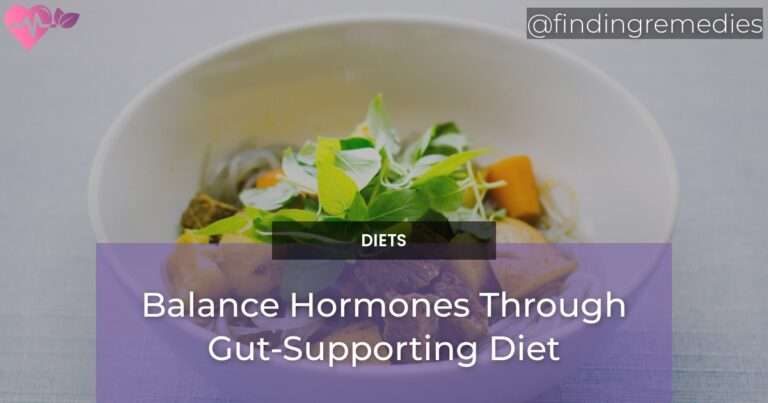Hormone balance plays a crucial role in our overall health and well-being. While many factors can affect hormone levels, one surprising contributor is our gut health. The gut, often referred to as our second brain, is home to trillions of bacteria that play a vital role in various bodily functions, including hormone regulation. In this article, we will explore the fascinating link between gut health and hormone balance and discover how we can use a gut-supporting diet to achieve hormonal equilibrium.
The Link Between Gut and Hormone Health
Importance of a Healthy Gut in Hormone Balance
A healthy gut is essential for maintaining proper hormone balance in the body. The gut microbiota, a diverse community of microorganisms living in our digestive tract, influences hormone regulation through various mechanisms. These microorganisms help break down food, produce essential nutrients, and metabolize hormones, all of which impact our overall hormonal health.
Gut Microbiota and Hormone Regulation
The gut microbiota produces and regulates many hormones, including estrogen and testosterone. These hormones play a crucial role in reproductive health, mood, and overall well-being. Imbalances in gut bacteria can lead to hormonal disruptions, affecting everything from our menstrual cycles to our mood stability.
ALSO READ
Gut Permeability and Hormonal Imbalances
Gut permeability, also known as “leaky gut,” occurs when the lining of the gut becomes compromised, allowing toxins and undigested food particles to enter the bloodstream. This can lead to inflammation, immune system dysregulation, and hormonal imbalances. Maintaining a healthy gut barrier is essential for optimal hormone balance.
Gut-Brain Axis and Hormone Regulation
The gut and brain communicate through the gut-brain axis, a bidirectional pathway that influences hormone production and regulation. Stress, emotions, and other psychological factors can disrupt this communication, leading to imbalances in hormone levels. By supporting our gut health, we can positively impact the gut-brain axis and promote hormonal balance.
Best Probiotic Foods for Hormones
ALSO READ
Yogurt and Kefir
Yogurt and kefir are excellent sources of probiotics, beneficial bacteria that promote a healthy gut microbiota. These dairy products contain live cultures that can enhance gut health and support hormone regulation.
Sauerkraut and Kimchi
Sauerkraut and kimchi are fermented vegetables that offer a wealth of probiotics. These traditional foods are rich in beneficial bacteria that can improve gut health and contribute to hormonal balance.
Kombucha
Kombucha is a fermented tea beverage known for its probiotic content. Regular consumption of kombucha can help replenish gut bacteria and support hormone regulation.
Pickles and Fermented Vegetables
Pickles and other fermented vegetables like pickled beets or carrots are another great source of probiotics. These tangy treats can contribute to a healthy gut environment and aid in hormone balance.
Estrogen Balancing Foods
Cruciferous Vegetables
Cruciferous vegetables such as broccoli, cauliflower, and kale contain compounds that support estrogen metabolism. These vegetables can help promote a healthy estrogen balance in the body.
Flaxseeds and Chia Seeds
Flaxseeds and chia seeds are rich in lignans, plant compounds that have estrogen-modulating properties. Including these seeds in our diet can help maintain optimal estrogen levels.
Citrus Fruits
Citrus fruits like oranges, lemons, and grapefruits are packed with antioxidants and vitamin C, which can aid in estrogen regulation. Eating a variety of citrus fruits can support hormonal balance.
Green Tea
Green tea contains catechins, which have been shown to help regulate estrogen levels. Enjoying a cup of green tea can have positive effects on hormonal health.
Gut Healing Foods for PCOS
Fiber-Rich Foods
A high-fiber diet can improve gut health and aid in the management of polycystic ovary syndrome (PCOS). Including foods like whole grains, legumes, and fruits and vegetables can support gut healing and hormonal balance.
Healthy Fats and Omega-3s
Healthy fats, especially those rich in omega-3 fatty acids, have anti-inflammatory effects and can benefit individuals with PCOS. Incorporating foods like fatty fish, avocados, and nuts into the diet can support gut healing and hormone regulation.
Bone Broth
Bone broth is a nutrient-dense food that contains collagen, gelatin, and various amino acids. These components can help heal the gut lining and improve hormonal imbalances associated with PCOS.
Probiotic-Rich Foods
Probiotic-rich foods, such as yogurt, kefir, and fermented vegetables, can support gut healing and reduce inflammation in individuals with PCOS. Including these foods in the diet can positively impact hormonal balance.
Other Factors Affecting Gut and Hormone Balance
Stress Management and Hormones
Chronic stress can disrupt gut health and hormone balance. Implementing stress management techniques like meditation, exercise, and self-care can support a healthy gut environment and promote hormonal equilibrium.
Exercise and Gut Health
Regular exercise has been shown to improve gut health by increasing microbial diversity and reducing inflammation. Engaging in physical activity can positively impact hormone regulation and overall well-being.
Avoiding Toxins and Hormone Disruption
Exposure to toxins, such as certain chemicals in household products or pesticides in food, can disrupt gut health and hormone balance. Opting for organic and non-toxic alternatives can minimize this risk and support optimal hormonal function.
Importance of Sleep for Hormone Balance
Adequate sleep is crucial for maintaining hormonal balance. Poor sleep can negatively impact gut health and lead to hormone imbalances. Prioritizing quality sleep can support a healthy gut environment and overall hormonal well-being.
Conclusion
Achieving hormone balance is a multifaceted endeavor, and our gut health plays a significant role in this process. By following a gut-supporting diet that includes probiotic foods, estrogen-balancing options, and gut healing foods, we can promote a healthy gut environment and support optimal hormone regulation. Additionally, considering other factors like stress management, exercise, toxin avoidance, and quality sleep can further enhance our efforts to achieve hormonal equilibrium. Remember, a comprehensive approach to gut and hormone health is key to reaping the benefits of a balanced and vibrant life.

